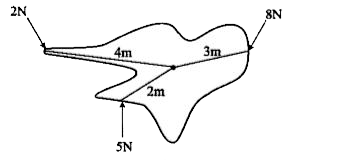Pancreatic lipase acts upon-
Glycogen
Triglycerides
Dissacharides
Polypeptides
The correct Answer is:2
Step-by-Step Solution:
1. Understanding Pancreatic Lipase: Pancreatic lipase is an enzyme produced by the pancreas that plays a crucial role in the digestion of fats. It specifically targets lipid molecules.
2. Identifying the Substrates: The question provides four options:
- Option 1: Glycogen
- Option 2: Triglycerides
- Option 3: Diglycerides
- Option 4: Polypeptides
3. Eliminating Incorrect Options:
- Glycogen: This is a polysaccharide that serves as a form of energy storage in animals. It is not a fat molecule, so pancreatic lipase does not act on it.
- Polypeptides: These are chains of amino acids that make up proteins. Since pancreatic lipase acts on fats, this option is also incorrect.
4. Analyzing the Remaining Options:
- Triglycerides: This is the main form of fat stored in the body and consists of one glycerol molecule and three fatty acids. Pancreatic lipase specifically acts on triglycerides to break them down into glycerol and free fatty acids.
- Diglycerides: This structure contains one glycerol molecule and two fatty acids. While pancreatic lipase can act on diglycerides, its primary function is to break down triglycerides.
5. Conclusion: The correct answer is Option 2: Triglycerides, as pancreatic lipase primarily acts upon triglycerides to facilitate fat digestion.
---
- Option 1: Glycogen
- Option 2: Triglycerides
- Option 3: Diglycerides
- Option 4: Polypeptides
- Glycogen: This is a polysaccharide that serves as a form of energy storage in animals. It is not a fat molecule, so pancreatic lipase does not act on it.
- Polypeptides: These are chains of amino acids that make up proteins. Since pancreatic lipase acts on fats, this option is also incorrect.
- Triglycerides: This is the main form of fat stored in the body and consists of one glycerol molecule and three fatty acids. Pancreatic lipase specifically acts on triglycerides to break them down into glycerol and free fatty acids.
- Diglycerides: This structure contains one glycerol molecule and two fatty acids. While pancreatic lipase can act on diglycerides, its primary function is to break down triglycerides.
Topper's Solved these Questions
- HUMAN PHYSIOLOGY -IBOOK - ALLENCHAPTER - HUMAN PHYSIOLOGY -IEXERCISE - Exercise-II(Previous Year Questions)
1 Videos
- HUMAN PHYSIOLOGY -IBOOK - ALLENCHAPTER - HUMAN PHYSIOLOGY -IEXERCISE - AIPMT 2007
1 Videos
- HUMAN PHYSIOLOGY -IBOOK - ALLENCHAPTER - HUMAN PHYSIOLOGY -IEXERCISE - DIGESTIVE GLANDS
14 Videos
- HUMAN HEALTH AND DISEASEBOOK - ALLENCHAPTER - HUMAN HEALTH AND DISEASEEXERCISE - Question
116 Videos
- HUMAN REPRODUCTION BOOK - ALLENCHAPTER - HUMAN REPRODUCTION EXERCISE - Question
92 Videos
Similar Questions
Knowledge Check
An irregular plane lamina is acted upon by several combination of forces. Is the lamina in equilibrium?
 AYesBNoCinsufficient dataDNone of the above
AYesBNoCinsufficient dataDNone of the above
Assertion : Pancreatic amylase digest protein to amino acid.
Reason : Pancreatic amylase breaks the peptide bond of protein.
View SolutionWhich of the following statements about the process of digestion is correct ?
I. Carbohydrates in the chyme are hydrolyzed by pancreatic amylase into monosaccharides directly .
II. Nucleases in the intestinal juice act on nucleic acids to from nucleotides and nucleosides .
View SolutionInsulin acts upon:
View SolutionThe pancreatic juice contains enzymes
View SolutionPancreatic juice helps in digestion of
View SolutionIn pancreas, pancreatic juice and hormones are secreted by
View SolutionThe pancreatic juice contains various enzymes, except
View Solution
